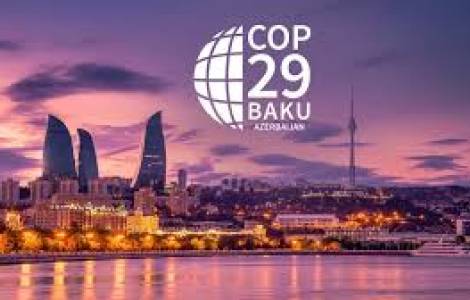
by Cosimo Graziani
Baku (Agenzia Fides) - From 11 to 22 November the annual Conference of the Parties (COP) of the United Nations Framework Convention on Climate Change will take place, in its 29th edition. This year the conference will take place in Baku (Azerbaijan), a country whose economy and development are based on the exploitation of hydrocarbons.
It is not the first time that the COP has been organized by an oil or gas producer: last year it was the turn of the United Arab Emirates, and in 2012 it was Qatar. But this and other aspects of the host country, combined with the current political situation around the world, make this year's conference a particularly important event, not only in terms of environmental issues.
The COP29 discussions will focus on revising the collective objectives in terms of their financing. The aim is to formulate new economic targets to help developing countries adapt and mitigate the effects of climate change. The starting point is the commitment made by developed countries, historically responsible for the majority of CO2 emissions, had made way back in 2009, that is, to allocate 100 billion dollars per year. In the current situation, that annual figure is no longer sufficient and will necessarily have to be raised.
It remains to be seen whether it will be objectively achieved, since the previously set threshold of $100 billion per year has never been reached.
Another important topic on the agenda is the revision of Article 6 of the Paris Agreement, which regulates emissions trading between states.
In terms of organizing the Conference, Azerbaijan has been coordinating in recent years with the United Arab Emirates and Brazil, the next organizer of the COP, in order to link the agenda as much as possible with the past and the future.
As part of this year's activities, Azerbaijani organizers have launched a number of environmental initiatives in parallel with the negotiations surrounding the event. These include the creation of a platform for dialogue between private individuals, government bodies and non-governmental organizations to help developing countries prepare and submit their Biennial Transparency Reports (BTRs), which all countries must submit from this year onwards, to document the measures they have taken to combat climate change.
However, there is a serious risk that environmental issues will be pushed into the background and overshadowed by issues affecting the host country itself.
Two issues in particular are at the heart of the criticism levelled at Baku in the run-up to the conference: the weight of hydrocarbons in the national economy and the profile of the political regime.
The state-owned Azerbaijani hydrocarbon company Socar will increase gas production in the coming years to fulfill contracts with European countries, for which Azerbaijan is the country that has replaced Russia in supplying energy sources. It is therefore questionable to what extent the country can really contribute to an effective climate agreement and whether critical voices can really be heard at the conference. The COP29 regulations, meanwhile, contain a provision in Article 16 requiring compliance with the laws of the Republic of Azerbaijan, which may be intended to silence critical voices. The Azerbaijani government, meanwhile, responded to such interpretations by stressing that foreign interference in the proceedings of the conference would not be accepted. However, the participation of representatives of non-governmental organizations is a cornerstone of the conference negotiations, and restricting their presence could affect the decision-making process and the final outcome.
Even more important is the possible entanglement of the COP with sensitive foreign policy issues. For months, Baku has been sending the message that it is seeking a "peace COP" in clear connection with the crisis between Armenia and Azerbaijan, even if the explicit references so far concern crises in Europe and the Middle East. (Agenzia Fides, 4/11/2024)